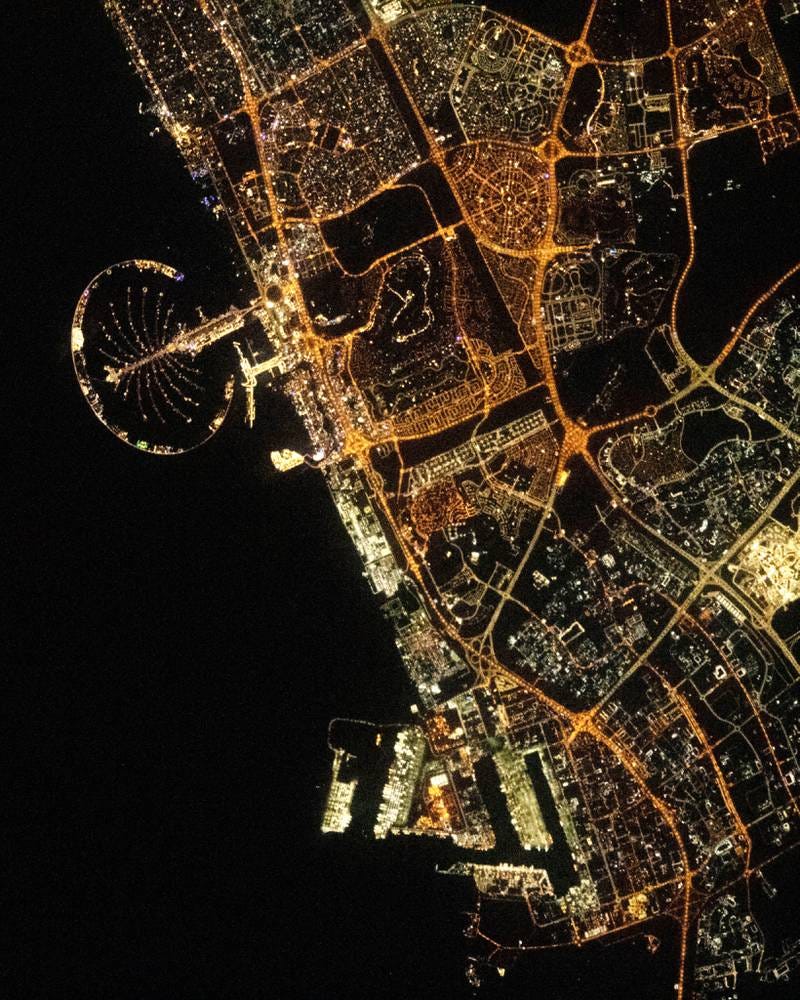Middle East Space Roundup: 30 April to 6 May 2023
A summary of all the space news in the Greater Middle East over the past week, powered by AzurX

The following are the major space developments in the Greater Middle East region tracked by Middle East Space Monitor over the past week:
1 May 2023
SatixFy Communications, a leading satellite communications company headquartered in Israel, has released its consolidated financial results for the full year 2022. The company faced supply chain constraints and challenges brought on by the COVID-19 pandemic. Despite these challenges, the company invested in R&D to advance its satellite communication systems and chipsets. SatixFy has shifted its focus to concentrate on key growth areas, such as chips, on-board processors, and payloads in the space industry, and high-end mobile terminals. The company also recruited some C-level executives with industry knowledge to help build a strong management team. SatixFy expects to release some important products by year-end, including two flagship space-grade application-specific integrated circuits and a revolutionary in-flight connectivity terminal product. The company's revenues were $10.6 million in 2022, compared to $21.7 million in 2021, due to supply chain constraints across the satellite industry, which resulted in order delays and project cancellations by certain current and prospective customers. SatixFy anticipates growth in revenue and an improvement in the bottom line with a reduction in losses in 2023.
Israel’s Gilat Satellite Networks Ltd. has received a multimillion-dollar order for very small aperture terminals (VSATs) to expand the rollout of an advanced disaster response network in Asia. The network will enable highly secure, bandwidth-efficient voice services, video feeds and multicasts, emergency alerts, mobility services, and data services to support effective disaster response capabilities for governmental bodies, individuals, and first responders. Gilat's equipment supports the national initiative in its efforts to expand and strengthen disaster prevention and administration, ensuring service continuity with high levels of throughput, quality, and resilience. Gilat Satellite Networks is a global provider of satellite-based broadband communications with a comprehensive portfolio of products to address key applications including broadband access, mobility, cellular backhaul, military, government, and enterprise.
Russia and Iran will begin a joint project to manufacture a scientific research satellite in two weeks, according to an announcement by Mohammad Moghimi, Chancellor of the University of Tehran. The aerospace departments of the University of Tehran and the University of Moscow have agreed to launch the joint project to build the satellite, after a visit by an Iranian academic delegation to Moscow last week. The project is expected to commence shortly, with the aim of sending a joint scientific research satellite into space in the near future. The two countries have been working together on scientific cooperation for several years, with Russia considered one of Iran's prioritised countries for technological relations.
Bahrain’s National Space Science Agency (NSSA) has submitted its proposed 2024-2028 space strategy for review by the 85 Bahraini stakeholders that utilise the services and expertise of the space agency. The head of the NSSA, Dr. Mohammed Al Asiri, says that the agency will continue to focus on developing Bahraini human capacity in the space and satellite sector, develop scientific research programmes, and provide space data and analytical studies to its stakeholders. Bahrain’s proposed 2024-2028 space strategy is also designed to contribute to sustainable development and economic growth. According to Rasha Al Amad, NSSA’s Strategic Planning Chief, the consultative period with the Bahraini stakeholders will be completed by he end of June 2023 and it is expected that the strategy will be officially released by the end of the year. Al Amad added that the 2024-2028 space strategy will be in line with Bahrain’s space policy and the Kingdom’s Economic Vision 2030.
3 May 2023
The space mission that will launch two astronauts from Saudi Arabia has been postponed just a week before the scheduled launch from the Kennedy Space Centre in Florida. Rayyanah Barnawi and Ali Al Qarni were due to take off on 8 May 2023 for a ten day stay on the International Space Station as part of Axiom Space’s second private human spaceflight mission. No explanation has been given for the delay. A new target launch date of 22 May 2023 has been announced by NASA, SpaceX, and Axiom Space. The Saudi astronauts will be joined by former NASA astronaut Peggy Whitson and pilot John Shoffner.
Commercial satellite communications company SES has partnered with Istanbul-based Profen Satellite Services in Turkiye to provide high-performance, low-latency satellite-based connectivity services to energy companies, government agencies, telco firms and humanitarian aid organisations across Turkiye, the Middle East and Africa. The partnership will see Profen deploy SES's second-generation medium earth orbit (MEO) system – O3b mPOWER – and build a gateway in Turkiye to jointly deliver high-performance connectivity to serve identified market opportunities of more than 10 Gb/s. Profen already provides satellite connectivity for media and broadcast, satellite networks, teleport services, TV contribution and distribution and uplink and downlink fields of activity. This new deal will enable the firm to offer its customers unprecedented access to high-performance connectivity services.
Boaz Levy, CEO of Israel Aerospace Industries (IAI), revealed in an interview with Israel Hayom that Israel is working on space warfare capabilities and investing in space programmes to stay ahead of potential threats, particularly from Iran. IAI has recently launched two high-resolution Earth observation satellites into space, EROS-C3 and Ofek 13. Israel currently has sufficient satellite coverage but is investing in additional satellites for more continuous coverage and communication capabilities. Finally, Levy mentioned that IAI is studying the possibility of developing space weapons, an area in which he says all superpowers are investing. Levy’s comments follow the recent creation of a Space Administration within the Israel Defense Force’s air force to take on more active military space operations.
The Egyptian Space Agency (EgSA) has announced the completion of the testing phase of MisrSat-2, following its successful completion of stage A, stage B, electromagnetic compatibility (EMC) tests, and other subsystem tests in Egypt. The MisrSat-2 project was delayed in 2022, but its completion will make Egypt the first country in Africa and the Arab region with satellite assembly and testing capabilities, boosting industrial growth in the country. The technology transfer project between Egypt and China has been working to provide Egyptian engineers and scientists with on-the-project experience in satellite design and integration using facilities available in Egypt. The China National Space Administration's (CNSA) Earth Observation and Data Centre team supervised the initial testing phase, and will continue to provide communication and coordination guidance, safety supervision, and management advice throughout the MisrSat-2 project.
4 May 2023
Tactical Report claims that Saudi Arabia’s Crown Prince Mohammed Bin Salman is planning to provide the Saudi Armed Forces and other key Saudi entities with advanced Chinese and Russian systems. Scopa Industries is reportedly in talks with Beijing to secure several agreements for this purpose, and Deputy Chairman of Scopa Industries, Mohammad Bin Abdulaziz Al-Ajlan, is discussing the acquisition of advanced Chinese satellites with China Aerospace Science and Industry Corporation (CASIC) and the China Aerospace Science and Technology Corporation (CASC). The focus of the talks is on synthetic aperture radar (SAR) satellites for intelligence, surveillance, and reconnaissance (ISR) purposes. The Jianbing line of SAR satellites produced by the Shanghai Academy of Spaceflight Technology (SAST) is being considered, as they have a mass of around 2,600 kilograms and provide high-resolution radar imagery. Scopa Industries is seeking to secure a significant contract, and Crown Prince Mohammed Bin Salman has expressed frustration with the slow pace of defence acquisitions, particularly in the area of space systems. Scopa is also looking to obtain additional technologies from CASIC as part of any deal, which may include satellite launch vehicle technology and anti-satellite (ASAT) systems, such as high-powered lasers.
The Armenian government is in the preliminary stage of launching a second high-resolution Earth observation satellite, ARMSAT-2, into space, according to Armenia’s minister of high-tech industry Robert Khachatryan. The work involves studying the market, evaluating capabilities, and proposals. Although it is unlikely that the satellite will be launched this year, the process is underway. Khachatryan said that Armenia has a ground centre and a receiving station, with the former being fully equipped and the latter awaiting the import of certain equipment. Khachatryan added that the images taken by the first satellite, ARMSAT-1, should be considered as a source of information that could be useful in the defence sector.
Iran and Syria have signed a memorandum of understanding to enhance cooperation in the field of communications and information technology (ICT). The Iranian Minister of Communications and Information Technology, Issa Zarepour, inked the joint agreement with his Syrian counterpart during a visit to Damascus, where President Ebrahim Raisi led a high-ranking delegation to hold talks with Syrian officials. The agreement covers a range of areas, including exporting technical and engineering services, telecommunications products, and e-training. The two countries also discussed renovating Syria's communications infrastructure, cooperating on space services, and offering e-government services. To implement the agreements, the two sides have established a joint specialized working group in the ICT field within two months. Iran has pledged to help Syria build communication satellites and increase exports in communication products.
5 May 2023
Kordsa, a global leader in composite materials and reinforcement technology headquartered in Turkiye, exhibited its innovations at the JEC World 2023 event in Paris. The global composite materials market is expected to reach a size of $128.82 billion by 2028, according to Vantage Market Research. Kordsa, with 13 production facilities, two R&D centers, and 4,900 employees in six countries, is focused on creating new business sectors in their areas of expertise and contributing to construction reinforcement with Kratos products. Kordsa CEO, Ibrahim Özgür Yıldırım, stated that their materials, which they produced on their 50th anniversary, have gone into space on the Orion capsule designed by NASA to transport astronauts.
6 May 2023

The UAE’s Mohammed Bin Rashid Space Centre (MBRSC) has announced that astronaut Sultan Al Neyadi, along with Crew-6 members Stephen Bowen, Warren Hoburg, and Andrey Fedyaev, has successfully relocated the SpaceX Dragon spacecraft on the International Space Station (ISS). The relocation marks the third such operation for a Dragon crew spacecraft and frees up the Harmony module's space-facing port for the next Dragon cargo spacecraft, due to launch in June. The move was supported by NASA's Mission Control Centre, SpaceX, and monitored by MBRSC. The successful completion of the mission will allow easier access for the Canadarm2 robotic arm to the International Space Station Roll-Out Solar Arrays (IROSAs) due to arrive on SpaceX's 28th commercial resupply mission for NASA.
Recommended Reading
Several interesting articles on Middle Eastern space and satellite activities were published last week:
Iain Akerman writes an engaging and comprehensive piece for the Middle East edition of Wired magazine titled “How the Arab world is fueling global space exploration efforts,” and features AzurX’s very own Anna Hazlett.
In Fast Company, Suparna Dutt Dcunha writes “Is the Middle East ready for a liftoff in the global space industry?”
Dr. Kristian Alexander and Gina Bou Serhal, both of the TRENDS think-tank in the UAE, write in The Media Line on how, “The UAE’s Space Program Is Propelling the Nation to the Forefront of Space Exploration.”
Be sure to catch up with space activities in the region in the next edition of Middle East Space Monitor’s space roundup!


